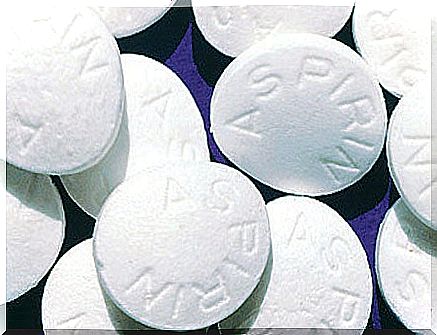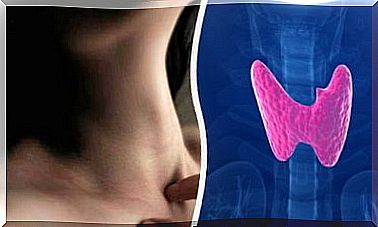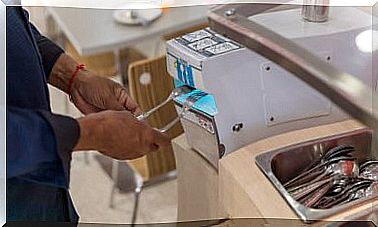What Should We Do If We Suffer From A Nosebleed?
Perhaps your nose has ever bled. Some people indicate that you have to bring your head back, others that it is better to plug with a piece of cotton and some say that it is convenient to lower the head well. So what should we do if we suffer from a nosebleed?
If you have asked yourself this question and are interested in knowing how to act, keep reading this article. We are going to explain how to act if we suffer a nosebleed , what to do and what is not recommended.
Nosebleed: What should we know?
It is the loss of blood from the protective tissue of the nose and usually occurs more frequently in the same nostril. It is very common, since in that area there are tiny blood vessels that can bleed from almost anything. Depending on the case of course.
Likewise, we tend to bleed more from the nose in winter due to colds, cold air, viruses, etc. Most nosebleeds occur at the tip of the nasal septum, that is, in the tissue that separates the two parts of the nose.
A study carried out by the Cuban Journal of Comprehensive General Medicine indicates that between 10 and 12% of patients seen in the otolaryngology emergency department tend to have nasal bleeding, and that there are 2 peaks of maximum incidence: one among the 15 and 25 years, and another between 45 and 65 years.
On the other hand, nosebleeds can be caused by very different reasons, including the following:
- Irritation of the nose.
- Allergies and rhinitis.
- Colds or sinus problems.
- Sneezing
- Surgeries, blows or trauma.
- Breathing dry or cold air.
- Forcefully blowing or picking your nose.
- Wounds or injuries to the nose, also objects stuck in it.
- Deviated septum.
- Abuse of decongestant sprays or chemical irritants.
We must be especially careful and pay attention to the number of times our nose bleeds. It can be a symptom of another disease. For example:
- Arterial hypertension
- Bleeding disorder
- Tumor in the nose or sinuses
- Reaction to certain medications
What to do if we suffer a nosebleed?
Remember these tips that you could carry out when you have a nosebleed, or if it happens to a person around you:
Keep upright position
Do not put your head back, nor lie down. It is best to sit in a chair and lean forward slightly so that the blood pressure in the nose decreases. This stops the bleeding faster.
Pinch the nose
If we suffer a nosebleed we must apply a little pressure on the upper part to stop the bleeding. The body will take care, in that time, to form a scab at the opening. Breathe easy through your mouth. Hold this pose for 10 minutes and see if the bleeding continues.
Don’t poke around
Many people make the serious mistake of sticking their fingers, a bit of cotton, or a swab into the hole that has just bled to “remove” everything that has been stored. The problem is that we can reopen the point where the bleeding has occurred or even damage another blood vessel.
On the other hand, it is advisable not to plug your nose with gauze or cotton. Also breathe through your mouth at least a few hours after the bleeding has stopped.
Cauterize
Of course, this should only be done by a professional. It is a good solution for those who suffer from frequent nosebleeds because it is always the same vessel that breaks.
In that case, different mechanisms can be used from laser to silver nitrate. It is always the doctor who determines the effectiveness or possibility of performing this treatment.
Call medical emergencies
It is very important to consult an emergency physician in certain situations. These are some of them:
- The bleeding does not stop after 20 minutes.
- The nose bleeds from a blow or head injury.
- Your nose has been broken from a blow or injury.
- Bleeding occurs too often.
- The bleeds are not related to an irritation or cold.
Helpful Questions and Answers
When we suffer a nosebleed, especially if it happens with a certain frequency, it is logical that doubts arise. These are some questions, with their corresponding answers, when it comes to nosebleeds.
How long does a nosebleed last?
The “normal” duration, to call it somehow, of bleeding through capillaries from the septum is between 7 and 15 minutes. During this period, the clot is formed that stops the blood from leaving the damaged vessel.
Can aspirin cause nosebleeds?

Yes, because they reduce the ability of the blood platelets to form the clot . It is common to hear that aspirin “liquefies” the blood and this is more or less what happens.
It is not that it becomes more liquid, but that it cannot create that natural plug that prevents more serious bleeding. If your nose starts to bleed because you are taking this medicine, consult your doctor.
Can bleeding be prevented?
If we suffer from a nosebleed, and once the episode has passed, it is advisable to take certain precautions :
- Avoid being in the sun or near other sources of heat.
- Do not eat food that is too hot.
- Do not scratch, pick, touch, or blow your nose.
- Avoid physical exertion, such as lifting heavy objects.
- Stop taking certain drugs.
- Treat allergy, cold or flu (if that’s the case).
What studies does the doctor perform in someone with habitual bleeding?

The professional may request various examinations of the patient. The most common would be the following:
- Nasal endoscopy (use of camera to examine the nose)
- Complete blood count (number of red and white blood cells, hemoglobin, hematocrits, etc)
- Computed tomography (CT) of the nose and paranasal sinuses
- Measurement of partial thromboplastin time (how long it takes for blood to clot)
- Control of blood pressure
There is no need to be alarmed if we suffer a nosebleed in isolation. But you do have to take steps to reduce bleeding. And it is very important to pay attention to what the causes are if it happens again after a short time.









